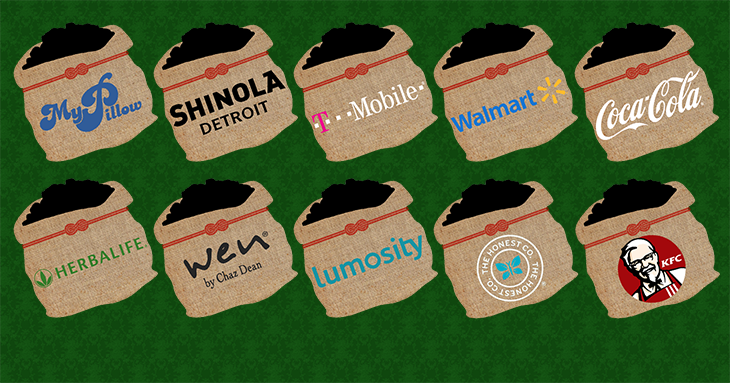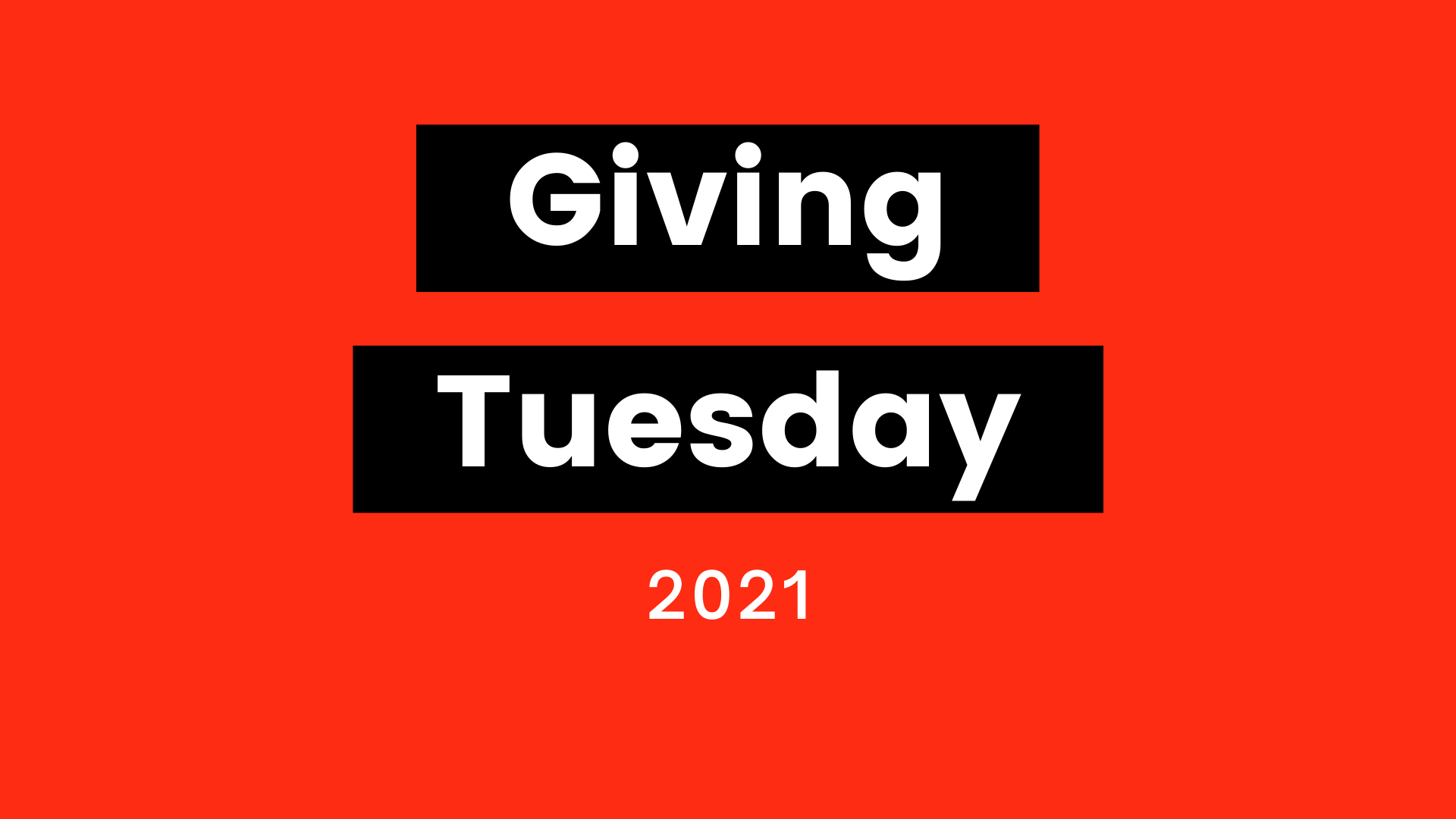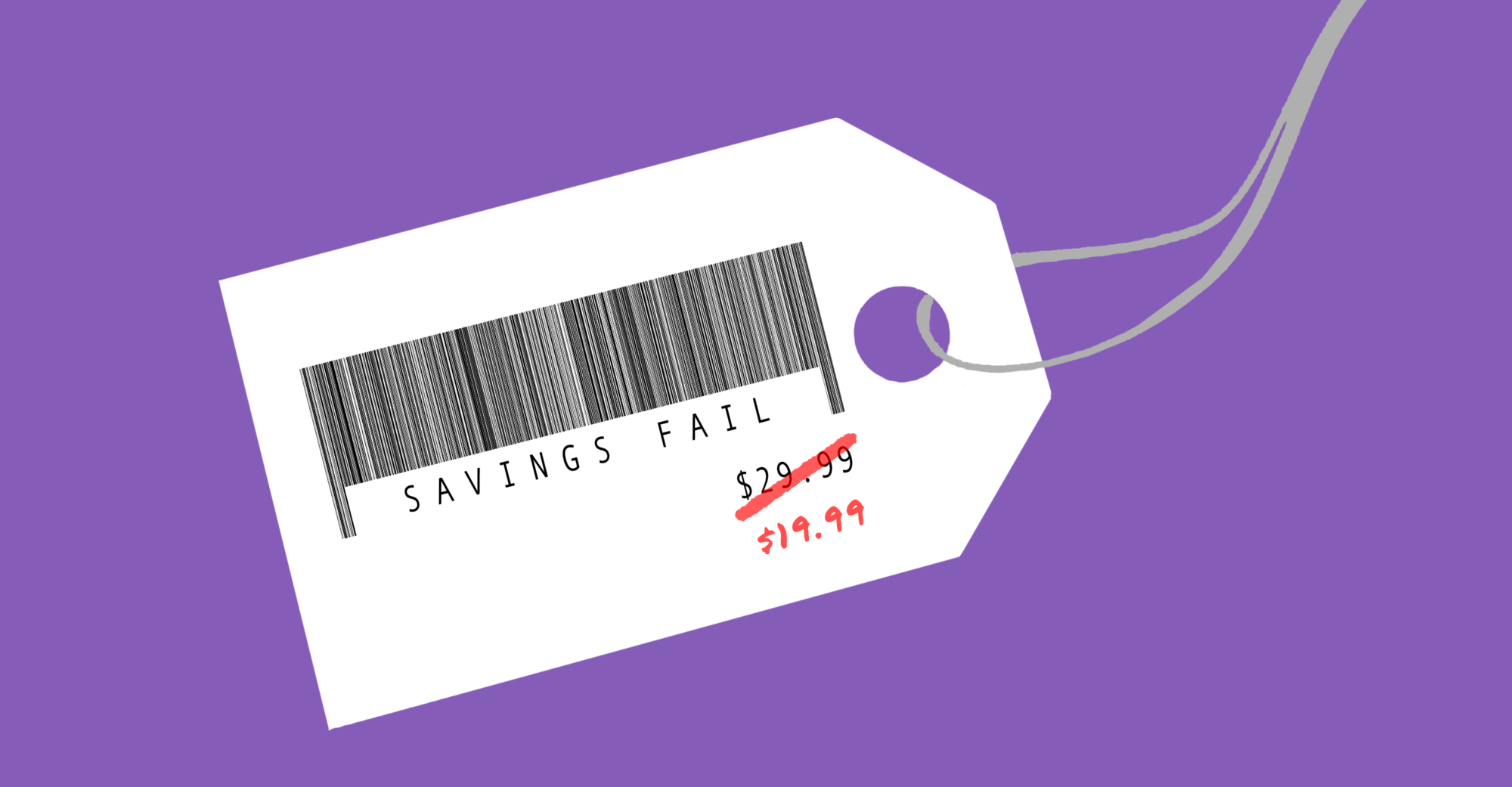
Best Reader Tips of 2021
This year reader tips led to dozens of ad alerts, as well as a complaint to regulators.
Find out which companies are on TINA.org's 2016 naughty list.
As we ring in the New Year we at TINA.org like to wring out companies whose advertising didn’t meet the truth-o-meter. This year’s list of companies that should get coal — notice we didn’t say clean coal — in their holiday stockings runs the gamut from wireless services to fast-food chains to mega retailers. (Not on the list is Wells Fargo, which the CFPB fined $100 million after employees opened credit card and bank accounts for customers without their knowledge or approval. That’s not quite deceptive advertising, though it’s deceptive. Just saying.) Here’s who is on TINA.org’s 2016 list (in alphabetical order):
Our question for Coke is how many times does TINA.org have to point out that a social media post by a celebrity or athlete or other assorted famous individual touting its products — see here and here and here — who have a material connection to the company (aka When an individual (or cute pet) promotes a good or service, primarily on social media, because they were paid to do so, or because of a material connection between the person (or pet) and the company) must be disclosed as an #ad? Sometimes the “#ad” appears on some posts but only after TINA.org asked Coca-Cola why the disclosure wasn’t on the post in the first place.
Bringing an end to one of the most high-profile pyramid scheme cases since Amway, Herbalife, a publicly traded California-based nutritional supplement and weight loss company, agreed to a $200 million settlement with the FTC that requires it to revamp its compensation system to reward distributors for sales to customers rather than for recruitment. While Herbalife spun the settlement as an acknowledgement that its business model is sound, and billionaire investor Carl Icahn, whose company owns significant shares in Herbalife, said the settlement concluded that Herbalife “is not a pyramid scheme.” FTC Chairwoman Edith Ramirez said she did not agree with Icahn’s statement. “They [Herbalife] were not determined not to be a pyramid,” she said. In fact, in a statement she said:
Herbalife is going to have to start operating legitimately.
One thing it still has to clean up: Inappropriate health claims being made about its products on social media.
Consumers are taking issue with whether Jessica Alba’s Honest Company, which sells personal care, cleaning, and baby products, is in fact being honest in its marketing.
The company is facing several legal challenges regarding claims that its products contain only natural ingredients and that its sunscreen is an effective sun blocker.
In addition, consumers should know its offer of a free trial for baby products is tied to an auto-ship program that costs more than $70 a month, which the company ineffectively discloses in its television ads of adorable dancing babies in teeny tiny print.
It’s not easy to feed a family at a decent price these days. So when a reader complained to TINA.org that the KFC $20 Family Fill Up bucket advertised on television was jam packed with chicken pieces in the commercial but not so packed with fried chicken when our reader picked it up from one of the actual restaurants, we looked into it. Sure enough, we had to dig a bit far into the bucket we bought to find the eight chicken pieces nestled there. And then, it happened again, with KFC’s 12-piece chicken tender bucket.
So either the buckets in the commercial are smaller than what customers get or there’s something at the bottom of the buckets propping up the pieces in the ads or there’s more pieces in the buckets in the commercials than you get in the restaurants, we just do not know. What we do know is that others are also upset about it. The company is now facing a $20 million lawsuit over the underfill.
We all get a bit unnerved when we lose our car keys or forget a doctor’s appointment so a product that claims it can strengthen our brain function is as appealing as a yoga teacher who encourages us to strengthen our core. But Lumos Labs, which markets Lumosity, ran afoul of the law by deceiving consumers with unfounded claims that the brain games could help them perform better at work and in school, reduce cognitive impairment associated with aging, and even protect against Alzheimer’s and dementia, the FTC alleged in a complaint against the company. The company also failed to disclose that consumers featured in testimonials had been solicited through contests that promised prizes, the FTC complaint alleged.
In January, to settle the charges, Lumos agreed to pay $2 million in consumer redress and provide customers — who paid $14.95 a month or about $300 a year for a lifetime subscription to the games — with an easy way to cancel their auto-renewal to avoid future billing.
This major cable television advertiser, which was at the center of a TINA.org investigation, is saying good night to claims that its pillows can prevent, treat, or cure diseases as part of an agreement reached with California consumer protection officials. TINA.org provided information to the consumer protection officials regarding several of the Minnesota-based company’s deceptive marketing issues following its own investigation and subsequent warning letter to the company earlier this year. Under the California agreement, MyPillow must also stop promoting its product as the “official pillow” of the National Sleep Foundation. MyPillow has until January 31, 2017 to comply with the agreement and the company looks inclined to run out the clock with an advertising blitz that still touts the official pillow claims.
Detroit-based Shinola has made a name for itself by promoting products as made in the Motor City. Except that some of those key products, including its watches, leather goods and bicycles, contain significant amounts of imported materials. That issue made the company’s “Built in Detroit” and “Where American is Made” claims problematic, the FTC said in a letter to the company this spring.
The FTC requires that in order to advertise a product as “Made in the USA” it should contain no or negligible foreign content.
In its June 16 letter to Shinola’s parent company, Bedrock Manufacturing Company, LLC, the agency pointed out that 100 percent of the cost of materials used in certain Shinola watches is attributable to imported materials, as well as 70 percent of the cost of materials in some decorative belts. The steel used in certain company bicycle forks is also made overseas.
In response, Shinola said it would roll back its “Where American is Made” slogan, and add some caveats to its “Built in Detroit” claims to alert consumers that certain products include significant imported content (such as putting “Swiss and imported parts” on its watches).
The FTC said it would continue to closely monitor the company’s advertising.
The self proclaimed “Un-carrier” advertises heavily about its unlimited data plans, even calling out its competition about data limits. But the “unlimited” plans actually come with speed and data restrictions. Yet, T-Mobile, the FCC said, failed to adequately inform customers that it applies slower data speeds and throttles customer traffic once certain usage thresholds are met.
The FCC said it received complaints from T-Mobile customers who felt misled when they discovered their “unlimited” data plan included “de-prioritized” data speeds after reaching these undisclosed thresholds. The company’s policy rendered their data services “unusable” for many hours each day, consumers told the FCC, which fined the company $48 million in October under a settlement agreement.
The company also faced some heat this year from an industry self-regulatory body over its “Ditch and Switch” promotion and the amount it advertised it would provide to consumers to get out of a competitor’s plan. This all may make its customers want to un-carry the company.
Back in 2015 Walmart made TINA.org’s coal list when our investigation into the retail giant’s advertised Made in the USA items revealed 200 instances of false and deceptive U.S.-origin claims. After TINA.org notified the company about the issue, Walmart pledged to clean it up. And yet this summer we found 100 more Made in the USA misrepresentations.
All this as the company continues to boast about its push to purchase $250 billion in American products by 2023.
WEN advertises that its hair care products add body and shine after just one use, giving customers a stronger and fuller head of hair. But in July, the FDA issued a safety alert that it is investigating reports of hair loss, hair breakage, balding, itching, and rash associated with the use of the WEN by Chaz Dean Cleansing Conditioner products.
The agency said it had received 127 adverse event reports directly from consumers about WEN, which is the largest number of reports ever associated with any cosmetic hair cleansing product. The FDA said it is also investigating more than 21,000 complaints reported directly to Chaz Dean and WEN marketer Guthy Renker, LLC, which it learned about during inspections of manufacturing and distribution facilities.
Guthy Renker is also facing civil actions concerning WEN’s advertising. It recently reached a preliminary settlement in a class-action lawsuit that alleged it falsely markets WEN Cleansing Conditioner as “gentle enough to use every day” when, in fact, the conditioner causes significant hair loss.
See which companies made our previous lists here.
This year reader tips led to dozens of ad alerts, as well as a complaint to regulators.
Support our mission of keeping ads honest by making a donation to TINA.org.
The illusion of savings.


